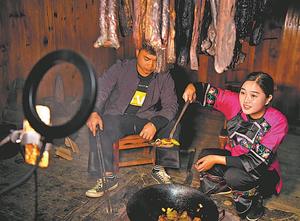Use of new technology has boosted the market for its produce and given residents a future they can believe in, Li Yingxue and Feng Zhiwei report.
 (From left) Shi Zhichun, Shi Linjiao and Shi Kang returned to their native Shibadong village to start a business together to promote and sell local products via short videos. (PHOTO PROVIDED TO CHINA DAILY)
(From left) Shi Zhichun, Shi Linjiao and Shi Kang returned to their native Shibadong village to start a business together to promote and sell local products via short videos. (PHOTO PROVIDED TO CHINA DAILY)
Since April 2020, Shi Zhichun has helped Shibadong, a village of the Miao ethnic group in the Xiangxi Tujia and Miao autonomous prefecture in the west of Hunan province, to sell over 2,000 kilograms of preserved pork. This has resulted in an income for the villagers of at least 200,000 yuan (US$30,960).
What's more, in January, the village's preserved meat factory went into production.
We can have over 100,000 views for each livestream show. We not only earn our living but also expand the market for the villager
Shi Zhichun, who livestreams to promote local produce in Shibadong village, Xiangxi Tujia and Miao autonomous prefecture, Hunan province
"When our high-quality preserved meat is put on the market, I'm planning on breaking the traditional sales pattern and do livestream broadcasting to sell our product. I also plan on establishing a media company that will focus on promoting our village," Shi says.
Named after the village's 18 natural caves, Shibadong has witnessed major changes through a series of industry-driven poverty alleviation efforts over the past eight years.
In 2013, the idea of targeted poverty alleviation was first introduced at the then poverty-stricken village while three years later, it was lifted out of poverty. It's also an epitome of Hunan province's efforts on targeted poverty alleviation.
According to Long Jilong, deputy director of the village, before the implementation of targeted poverty alleviation, nobody knew about their village which had an undeveloped infrastructure.
"There was no highway then and we had to wear rubber shoes when it rained. However, we now have the six-meter-wide gravel road," Long says.
Long says that in the past, most villagers only planted crops such as corn and rice, and five to six hundred villagers went to cities to work, leaving behind only the old and children in the village. "The per capita income of Shibadong villagers was only 5,000 to 6,000 yuan then," he recalls.
"We used to cut trees to sell as firewood. There were even times when there were not enough trees left for building a house," he says.
The village developed several pillar industries based on local conditions including the traditional craftwork of the Miao ethnic group and production of mountain spring water. The red tourism and livestream shows are also the modern solution for the village's targeted poverty alleviation.
 Shi Zhichun (left) and Shi Linjiao during a livestream show that promotes local foods. (PHOTO PROVIDED TO CHINA DAILY)
Shi Zhichun (left) and Shi Linjiao during a livestream show that promotes local foods. (PHOTO PROVIDED TO CHINA DAILY)
In 2017, Shi went back to Shibadong to teach English after he graduated from the law school at Jishou University in Jishou city in Hunan, becoming the first villager who returned to work with a master's degree.
Shi knows deeply that even though the village was lifted out of poverty in 2016, the villagers' life is still some distance from the "good life".
"Even though the village is developing, and conditions are much better than before, it still cannot satisfy the labor force's needs," Shi says.
He recalls that he wanted to let more people know about his village during college, and the thought became stronger after graduation, although he didn't know how to start.
Shi first tried to run a WeChat account to tell people stories about Shibadong. When short video platform Douyin became popular nationwide, Shi knew that there was an opportunity for promotion.
In 2018, Shi asked his friend Shi Kang, who is also from the village and was working in new media in Hunan's capital Changsha, to start up a business together to promote and sell their stories via short video.
Shi Kang refused the offer because he thought he was inexperienced in this field, but he found a short video related job in Changsha for future entrepreneurial experimentation.
At the same time, Shi Zhichun found his own way to promote Shibadong by singing Miao songs and telling Miao stories for tourists.
At the end of 2019, it was finally time for the duo to discuss the possibility to start up a business on short video again. They met another possible partner-Shi Linjiao, who graduated from Zhejiang Conservatory of Music in 2019 and just quit her publicity job in Liuyang to return to Shibadong.
They soon chimed in easily and had a clear division-Shi Zhichun is responsible for the planning of the video content as he knows better about the village, Shi Kang is responsible for filming and editing and Shi Linjiao's job is to stand in front of the camera as a host.
The trio started with livestreaming on daily farm work of the Miao people. To find a better camera shot, they often examined vantage points in the village.
In April 2020, they started to sell their products through livestream shows. These included preserved meat, eggs, honey and pickled radish. They also help the villagers to sell other products during the COVID-19 pandemic.
"Preserved meat is a special food in Xiangxi which every family can make. The meat made in our village is especially good in flavor because the fresh pork is smoked using firewood rather than by machine," Shi Zhichun explains.
"We can have over 100,000 views for each livestream show. We not only earn our living but also expand the market for the villagers," Shi Zhichun says.
 Shi Zhichun (left) and Shi Linjiao take videos to showcase the life of Miao people. (PHOTO PROVIDED TO CHINA DAILY)
Shi Zhichun (left) and Shi Linjiao take videos to showcase the life of Miao people. (PHOTO PROVIDED TO CHINA DAILY)
According to him, the preserved meat is sold 100 yuan per kilogram while on the livestream show it can be sold at 130 yuan, which can bring more income for the villagers.
For the coming Spring Festival holiday, Shi is busy planning on how to be creative in his shows to make a good start for Shibadong's preserved meat brand.
Shibadong is one example of Hunan province's major poverty relief achievements in recent years. All 51 impoverished counties and 6,920 impoverished villages in the province have been lifted out of poverty in the past eight years.
According to Wang Zhiqun, head of Hunan poverty relief office, they have built seven leading agricultural industries in impoverished areas and founded over 17,000 industrial poverty relief cooperatives which helped 3.56 million registered impoverished people to overcome poverty through characteristic industries.
"We have explored a series of reproducible and propagable 'Hunan experience' items during the poverty alleviation such as microcredit loans. Villages including Shibadong, Changputang and Shazhou have become the national model in targeted poverty alleviation," Wang says.
According to Wang, red tourism has played an important role in targeted poverty alleviation in Hunan.
Wang says in November 2020, the Hunan local government collaborated with Jiangxi authorities to host a national red tourism expo in Changsha to promote the red tourism development in both provinces.
"We have updated our red tourism products to help with targeted poverty alleviation," Wang says, adding that they have also perfected the road network for multiple red tourism routes.
In 2021, the red tourism special railway line from Shaoshan, the birthplace of Mao Zedong, to Jinggangshan in Jiangxi will go into operation.
"We also focus on developing the related industries around red tourism to help with targeted poverty alleviation. For example, in Shaoshan, a large group of rural tourism projects have been seamlessly connected to the red tourism industry, which has become a new engine for driving local economic development," Wang says.
"Shibadong village's red tourism development measures have shown remarkable achievement in accelerating poverty relief, which has a positive impact in the province and even in the whole country."
Contact the writers at liyingxue@chinadaily.com.cn


